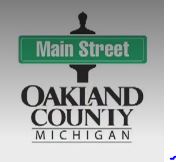
small Businesses Receive $10,000 Boost From ITC Michigan
Main Street Oakland County Crowdfunding Campaign To Help Small Businesses Hurt By COVID-19 Receives $10,000 Boost From ITC Michigan
Pontiac, Michigan – The Main Street Oakland County crowdfunding campaign to support downtown small businesses struggling because of the coronavirus pandemic has raised more than $300,000 thanks to a recent $10,000 boost from ITC Michigan, based in Novi, Michigan.
The countywide campaign, launched in the early days of the pandemic last year, is the first of its kind in the nation to be sponsored by a Main Street program. The funds were generated from 21 of Main Street Oakland County’s 25 designated communities. The campaign surpassed its original $100,000 goal due to generous contributions from the general public, local governments and corporations, like ITC.
Funds raised were utilized by local downtown management organizations to provide grants for more than 200 small businesses independently owned and operated with 30 employees or less, including retailers and restaurants in the various downtown districts.
“Small businesses are the life blood of our economy and the hope for our future when we emerge from the COVID-19 pandemic,” Oakland County Executive David Coulter said. “That’s why it’s been vital to support them throughout this public health crisis in a number of ways, including with the Main Street Oakland County crowdfunding campaign. Thank you to ITC Michigan for their generosity.”
Main Street Oakland County matched dollars raised by each community at $1 for each $1 contributed, up to $4,000. The campaign used the Patronicity platform, and each community set their own fundraising goals and made their case to the public to build their fund.
“ITC Michigan has always taken an active role in the communities we serve,” said Simon Whitelocke, president of ITC Michigan. “During this extraordinary time, there are tremendous humanitarian and economic needs across our home state. We’re proud to support the Main Street Oakland County crowdfunding campaign, which is making a positive impact on the small business community that is so vital to our economy.”
The crowdfunding campaign was one of the many ways Oakland County assisted businesses throughout the pandemic. The Oakland County Executive and the Board of Commissioners allocated over $80 million of the county’s share of CARES Act funding to small businesses. These included:
- $32 Million Grant Fund to assist 3,153 retail, restaurants, and other businesses
- $14 Million Stabilization Fund for 3,500 small business
- $11 Million Michigan Small Business Restart Grant helped nearly 3,000 Oakland County businesses including minority-, women-, and veteran-owned businesses.
- $10 Million Oakland Together Restaurant Relief Program for about 785 restaurants.
- $10 Million Industry 4.0 PPE Resilience Grants Program approved grants for 235 businesses.
- $1 Million to 23 companies who shifted production to personal protective equipment such as masks, gowns, and face shields.
- 15,000 Small Business Reopening Kits which contained PPE.
Plus, the county coordinated the Michigan Small Business Survival Grant which awarded over $6 Million to 1,348 businesses.
The following crowdfunding participating communities, ranging from 600 to 60,000 in population, met or exceeded their funding marks over the course of the two-month campaign: Berkley, Birmingham, Clarkston, Clawson, Farmington, Ferndale, Franklin, Hazel Park, Highland, Holly, Lake Orion, Lathrup Village, Leonard, Madison Heights, Oak Park, Ortonville, Oxford, Pontiac, Rochester, South Lyon and Wixom.
The crowdfund contributions were used by each community to help their small businesses pay for rent, utilities, wages, inventory, PPE acquisition, and marketing. For example, the Ferndale Downtown Development Authority utilized funding to develop a marketplace for their small businesses where they could obtain difficult to find PPE at no cost. The Wixom Downtown Development Authority provided grants to small businesses that allowed them to keep operating and prevent their permanent closure.
All donations were coordinated through the Community Foundation of Greater Rochester. Questions about the program can be sent to Main Street Oakland County coordinator John Bry at bryj@oakgov.com.
In 2020, public and private investment in Main Street Oakland County totaled almost $36 million and resulted in 24 net new jobs; 36 net new businesses; and contributions of more than 16,308 volunteer hours.
To date, more than $962 million in public and private investments have been made to Main Street Oakland County downtowns, establishing 1,254 net new businesses and generating more than 8,000 jobs. Oakland County is the first and still only county in the United States to operate a full-service, county-wide Main Street program.



.jpeg)

